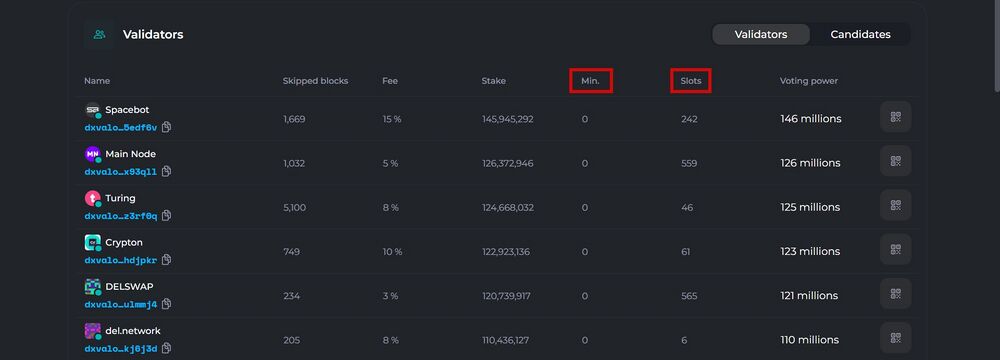Slot: Difference between revisions
| [checked revision] | [checked revision] |
No edit summary |
CryptoUser (talk | contribs) m (CryptoUser moved page Commoninfo:slot to Slot) |
||
| (3 intermediate revisions by 2 users not shown) | |||
| Line 1: | Line 1: | ||
{{#seo: | {{#seo: | ||
|title= | |title= Slot — Decimal Wiki | ||
|titlemode= append | |titlemode= append | ||
|keywords= | |keywords= Slot | ||
|description= | |description= Slot | ||
}} | }} | ||
'''Slot''', in programming, refers to a placeholder or a memory location used to store [[data]]. It can be thought of as a variable or a container that holds a value. Slots are commonly used in various programming languages and [[framework]]s, such as object-oriented programming, GUI frameworks, and data structures. | |||
The word '''slot''' in the [[Decimal ecosystem|DecimalChain ecosystem]] is used in the meaning of '''free space'''. | |||
== Validator's slot == | |||
There can be a maximum of ''64 [[validator]]s'' in the [[DecimalChain]] [[network]]. Initially, the network started with four validators, and then ''every 30 days, an additional four slots open''. At the time of writing this article, 28 validator slots are free and the next four will be unlocked after 342,246 [[block]]s (~24 days). | |||
[[File:En-slot.jpg|1000px|thumb|left]]<br clear="all"> | |||
== Delegator`s slot == | |||
The [[delegation]] of [[coin]]s takes place in the so-called slots. Each validator has '''1,000 slots'''. Each individual coin of the network is delegated to its own slot, that is, all [[DEL]] coins will be credited to one slot, and the next slot will be provided for each other coin. The number of coins in the slot is not limited. | |||
If the validator has all the slots out of 1,000 filled, then 1,001 delegates must send at least as many funds as they are in the last slot. | |||
If 1,001 delegates send more coins than in the minimum slot number 1,000, then the funds in it (in slot number 1,000) are forcibly separated and immediately appear on the owner's balance. | |||
'''At this stage, all Decimal network validators have a maximum of 101 slots occupied, so the "Min." column displays the indicator 0'''. | |||
[[File:En-slot2.jpg|1000px|thumb|left]]<br clear="all"> | |||
'''Example:''' | |||
Imagine that the [[Masternode|Main Node]] validator has all slots out of 1,000 occupied. Then the "Min." column will display the size of the delegate's minimum [[stake]]. | |||
Let's say the minimum stake of the Main Node validator is 1,000 coins, and this stake is yours. If one of the new delegators sends 1,001 coins to the Main Node validator, then your 1,000 coins will be instantly divided and will be on your balance. | |||
Imagine that you delegated 1,000 DEL coins to the Main Node validator, so you occupied one slot. Then you delegated 1,000 [[DAR]], thereby taking another slot. A month later, you decided to increase the Main Node validator's stake and sent another 1,000 DEL, and they summed up with the previous DEL coins in the same slot as the first 1,000 DEL, now there are 2,000 DEL in your one slot, and 1,000 DAR in your second slot. | |||
[[Category:Commoninfo]] | |||
[[Category:Blockchain]] | |||
Latest revision as of 09:13, 15 February 2024
Slot, in programming, refers to a placeholder or a memory location used to store data. It can be thought of as a variable or a container that holds a value. Slots are commonly used in various programming languages and frameworks, such as object-oriented programming, GUI frameworks, and data structures.
The word slot in the DecimalChain ecosystem is used in the meaning of free space.
Validator's slot
There can be a maximum of 64 validators in the DecimalChain network. Initially, the network started with four validators, and then every 30 days, an additional four slots open. At the time of writing this article, 28 validator slots are free and the next four will be unlocked after 342,246 blocks (~24 days).

Delegator`s slot
The delegation of coins takes place in the so-called slots. Each validator has 1,000 slots. Each individual coin of the network is delegated to its own slot, that is, all DEL coins will be credited to one slot, and the next slot will be provided for each other coin. The number of coins in the slot is not limited.
If the validator has all the slots out of 1,000 filled, then 1,001 delegates must send at least as many funds as they are in the last slot.
If 1,001 delegates send more coins than in the minimum slot number 1,000, then the funds in it (in slot number 1,000) are forcibly separated and immediately appear on the owner's balance.
At this stage, all Decimal network validators have a maximum of 101 slots occupied, so the "Min." column displays the indicator 0.

Example:
Imagine that the Main Node validator has all slots out of 1,000 occupied. Then the "Min." column will display the size of the delegate's minimum stake.
Let's say the minimum stake of the Main Node validator is 1,000 coins, and this stake is yours. If one of the new delegators sends 1,001 coins to the Main Node validator, then your 1,000 coins will be instantly divided and will be on your balance.
Imagine that you delegated 1,000 DEL coins to the Main Node validator, so you occupied one slot. Then you delegated 1,000 DAR, thereby taking another slot. A month later, you decided to increase the Main Node validator's stake and sent another 1,000 DEL, and they summed up with the previous DEL coins in the same slot as the first 1,000 DEL, now there are 2,000 DEL in your one slot, and 1,000 DAR in your second slot.